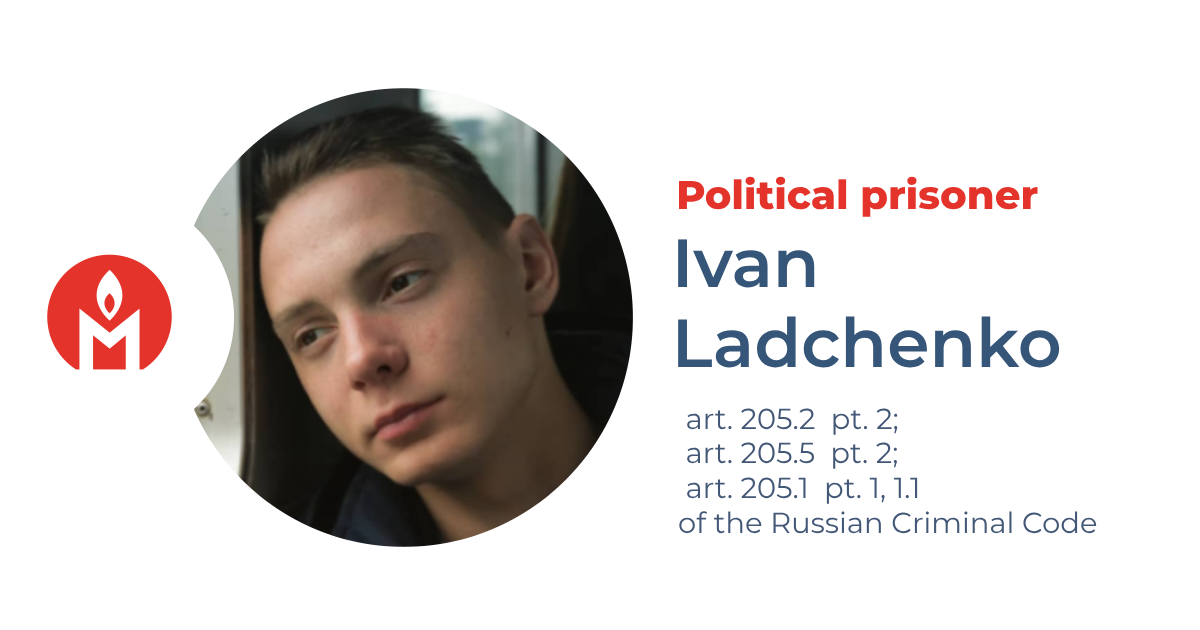Ivan Ladchenko is a political prisoner
A St. Petersburg musician has been sentenced to 11 years in a strict regime penal colony for putting up flyers about the Russian Volunteer Corps and the Free Russia Legion
The ‘Political Prisoners. Memorial’ human rights project, in accordance with international standards, considers Ivan Ladchenko a political prisoner. Ladchenko has been convicted of incitement to terrorism, making public calls to engage in terrorism, and participation in a terrorist organisation, for sticking up flyers about the Russian Volunteer Corps and the Free Russia Legion. Ladchenko’s prosecution and conviction violate his right to a fair trial. We demand that all criminal charges against him be dropped.

What were the charges against Ivan Ladchenko?
In August 2023, the Investigative Committee announced the arrest in St. Petersburg of a person suspected of sticking up flyers from a ‘Ukrainian paramilitary organisation.’ The authorities seized flyers about the Russian Volunteer Corps and the Free Russia Legion and allegedly found messages on the suspect’s phone exchanged with a ‘curator’ discussing fundraising for Ukraine’s armed forces. The suspect was soon identified as Fyodor Konovalov, who was remanded in custody. We recognised Konovalov as a political prisoner.
The existence of a second defendant in the case, Ivan Ladchenko, only became known after Konovalov’s sentencing. It was later revealed that Ladchenko had been detained on 16 October 2023 and placed under house arrest. In March 2024, he was added to Rosfinmonitoring’s list of terrorists and extremists.
Both defendants were charged with incitement of terrorism (Article 205.1, Parts 1 and 1.1, of the Russian Criminal Code), making public calls to engage in terrorism via the Internet (Article 205.2, Part 2), and participation in a terrorist organisation (Article 205.5, Part 2).
On 3 October 2024, a military court sentenced both Ivan Ladchenko and Fedor Konovalov to 11 years’ imprisonment, with the first three years of their sentences to be served in a cell-type prison and the remainder in a strict regime penal colony. Ladchenko was taken into custody in the courtroom.
Why do we consider Ivan Ladchenko a political prisoner?
We believe there were no grounds for the prosecution of Ivan Ladchenko. Even if he did stick up flyers about the Free Russia Legion and the Russian Volunteer Corps, his actions did not constitute a crime.
We consider the designation of the Free Russia Legion and the Russian Volunteer Corps as terrorist organisations unlawful. These units were formed, and officially operate, as part of the Ukrainian army alongside other military units defending Ukraine from Russian aggression. Consequently, disseminating information about these groups or interacting with them should not be prosecuted on charges of terrorism.
Moreover, it would appear Ladchenko’s conviction was also unlawful on grounds of double jeopardy: he was punished twice for one and the same act. Ladchenko, convicted on the charge of ‘making public calls to engage in terrorism’ for putting up the flyers, was convicted on these same grounds on the charge of ‘incitement of terrorism.’
Furthermore, it is absurd to classify Ladchenko’s actions as ‘propaganda of terrorism via the Internet,’ simply because he downloaded templates for the flyers.
A detailed description of Ivan Ladchenko’s case and of our position is available on our website.
Recognition of an individual as a political prisoner does not imply the ‘Political Prisoners. Memorial’ human rights project agrees with, or approves, their views, statements, or actions.
How can you help?
You can write to Ivan Ladchenko at the following address:
In Russian:
196655, Санкт-Петербург, Колпино, ул. Колпинская, д. 9, ФКУ СИЗО-1 УФСИН России по Санкт-Петербургу и Ленинградской области, Ладченко Ивану Владленовичу 1998 г. р.
In English:
Ivan Vladlenovich Ladchenko (born 1998), Remand Prison No. 1, Federal Penitentiary Service of Russia for St. Petersburg and Leningrad Oblast, 9 Kolpinskaya Street, Kolpino, St. Petersburg, 196655, Russia.
You can also send emails via the F-Pismo and ZT services (for payment with Russian bank cards), PrisonMail (for payment with other bank cards), OVD-Info and Memorial-France (free of charge).
Please note that letters in languages other than Russian are highly unlikely to reach the recipient.
You can donate to help all political prisoners in Russia.
